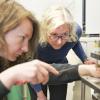Lisa Marshall
 Four years after the U.S. began to slowly emerge from mandatory COVID-19 lockdowns, a study of 7,000 aging adults suggests that for many, life has never been the same.
Four years after the U.S. began to slowly emerge from mandatory COVID-19 lockdowns, a study of 7,000 aging adults suggests that for many, life has never been the same. Armed with up to $39 million in federal funding, a dream team of researchers from three Colorado campuses aims to end osteoarthritis.
Armed with up to $39 million in federal funding, a dream team of researchers from three Colorado campuses aims to end osteoarthritis. A new CU Boulder study sheds light on how genes associated with smoking work in conjunction with the rest of the genome, paving the way for more personalized approaches to help people kick the habit.
A new CU Boulder study sheds light on how genes associated with smoking work in conjunction with the rest of the genome, paving the way for more personalized approaches to help people kick the habit. The first randomized trial to examine how commercially available cannabis impacts anxiety symptoms has shown that products heavy in the nonintoxicating compound CBD work surprisingly well—and without getting you high.
The first randomized trial to examine how commercially available cannabis impacts anxiety symptoms has shown that products heavy in the nonintoxicating compound CBD work surprisingly well—and without getting you high. Increased access to prescription opioids and a shrinking economic safety net contributed to an increase in suicide rates in the 21st century, according to new CU Boulder research.
Increased access to prescription opioids and a shrinking economic safety net contributed to an increase in suicide rates in the 21st century, according to new CU Boulder research.
 The brain produces more of the pleasure-inducing hormone dopamine when we’re longing for or hanging out with our partner, according to research by CU Boulder neuroscientists. But when we break up, that unique “chemical imprint” fades away.
The brain produces more of the pleasure-inducing hormone dopamine when we’re longing for or hanging out with our partner, according to research by CU Boulder neuroscientists. But when we break up, that unique “chemical imprint” fades away. A first-of-a-kind laboratory study of runners shows that using cannabis before training can boost motivation and mood. However, if the THC content is high, it can also make exercise feel harder, potentially sabotaging performance.
A first-of-a-kind laboratory study of runners shows that using cannabis before training can boost motivation and mood. However, if the THC content is high, it can also make exercise feel harder, potentially sabotaging performance. A new study of compounds found in baby poop suggests breast milk, including milk supplemented with formula, improves infant gut health in ways that benefit brain development and could impact test scores. The findings could also be used to improve formula.
A new study of compounds found in baby poop suggests breast milk, including milk supplemented with formula, improves infant gut health in ways that benefit brain development and could impact test scores. The findings could also be used to improve formula. People are increasingly turning to videos on TikTok, Instagram and other social media to stay up to date on the Israel-Hamas war. But media studies expert Sandra Ristovska gives her take, warning you can’t always trust what you see, and sharing without confirming can be dangerous.
People are increasingly turning to videos on TikTok, Instagram and other social media to stay up to date on the Israel-Hamas war. But media studies expert Sandra Ristovska gives her take, warning you can’t always trust what you see, and sharing without confirming can be dangerous. Nearly one in five school-aged children and preteens now take melatonin for sleep, and some parents routinely give the hormone to preschoolers, according to new CU Boulder research.
Nearly one in five school-aged children and preteens now take melatonin for sleep, and some parents routinely give the hormone to preschoolers, according to new CU Boulder research.


